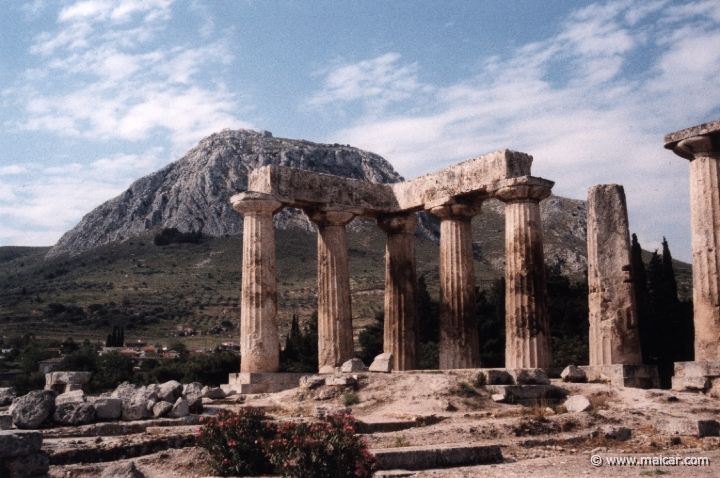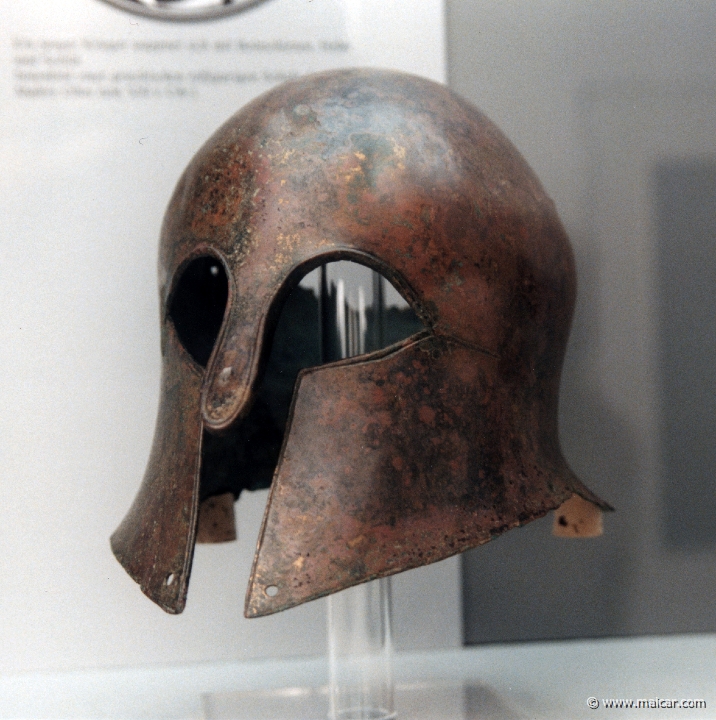|

|
6619: Temple of Apollo and the Acrocorinth. Corinth, AD 2001.
|
|
Corinth is as city at the western end of the Isthmus, joining the Peloponnesus to Boeotia. The city was first named Ephyra or Ephyraea, because, as it is told, the Oceanid Ephyra 1 was the first to dwell in Corinth.
Corinth assigned to Helius
According to the Corinthians, the Hecatoncheire
Briareus arbitrated between Helius and Poseidon, who had a
dispute concerning the lands about Corinth.
Briareus assigned to Poseidon the Isthmus of Corinth and the adjacent lands, and gave to Helius the height above
the city (Acrocorinthus).
Harbors of Corinth
The Corinthian harbors of Lechaeum and Cenchrae are called after Leches and Cenchrias, sons of Poseidon and Pirene 2, daughter of the river god Achelous. Pirene 2, who others call daughter of Oebalus 1 and Batia 2, became a spring because of her many tears, shed in lamentation for her son Cenchrias, who was unintentionally killed by Artemis.
First kings of Corinth
Helius gave Asopia
(Sicyon) to Aloeus 2 and Ephyraea (Corinth) to Aeetes. These two were
sons of Helius and
Perseis. But Aeetes left
the city, and having settled far away in Colchis,
became king there. On leaving, Aeetes entrusted the
kingdom to Bunus, son of Hermes and Alcidamea. When Bunus died, Epopeus 1, who had come from Thessaly and taken the kingdom of Sicyon after the death of Corax, now annexed the kingdom of Corinth. Epopeus 1 died of a neglected wound inflicted in battle during his war against the Thebans (for more details about Epopeus 1 see also Oedipus, and Robe & Necklace of Harmonia 1).
Marathon
When Epopeus 1 died, his son by Antiope 3, Marathon, who had escaped from his father's lawless violence, returned to the Peloponnesus, and divided his kingdom among his sons Corinthus and Sicyon. Having done this, Marathon went back to the sea coast in Attica where he had previously settled.
Bandits related to the king
In this way, Corinthus became king of the city that was named after him. Some say Corinthus was father of Sylea, who married the bandit Procrustes, also called Damastes and Polypemon. This Procrustes offered hospitality to the passers-by and laid the short men on a big bed and hammered them, to make them fit in the bed. And the tall men he laid on a little bed and sawed off the portions of their bodies that projected beyond it. Procrustes is one of the bandits killed by Theseus. Procrustes
and Sylea had a child Sinis, who used to force the
passers-by to keep bending pine-trees, but being
too weak to do so were tossed up by the trees and
perished. Theseus punished this bandit too, and having killed him, he found it most appropriate to ravish Sinis' daughter Perigune. She fled when her father was killed, but was easily overtaken by Theseus. Later, Perigune gave birth to Melanippus 7, the father of Ioxus, who led a colony into Caria (Asia Minor).
Queen Medea
But others say that King Corinthus died
childless, and that upon his death the Corinthians
sent for Medea, daughter
of King Aeetes of
Colchis. Medea had, after
her trip with the ARGONAUTS, settled in
Iolcus together with her husband Jason. So, according to
this account, Jason and Medea became the rulers of
Corinth. Medea concealed
her children by Jason in
the sanctuary of Hera,
hoping that they would become immortal, but was
detected by Jason, who
refused to pardon her and sailed to Iolcus. Medea then left Corinth,
and handed over the kingship to Sisyphus. However, others say that Medea was just a common citizen in Corinth, and that the king at that time was Creon 3, her conflict with Jason being of quite another nature.
Sisyphus
Sisyphus, who sometimes is said to have been the founder of Corinth, is mostly remembered for having betrayed Zeus'
secret concerning the abduction of Aegina. For when Zeus had secretly carried
her off, Sisyphus told the secret to her father, the river god Asopus, who naturally was looking for her. For being such a gossipmonger, Sisyphus is still being
punished in the Underworld, rolling a stone with his hands and head in an effort to heave it over the top of a hill; but no matter how much he pushes, the stone always rebounds backward again.
Succession from father to son
The throne went then from father to son: from Sisyphus to Ornytion, to Thoas 8, to Damophon, to Propodas, and finally to Doridas and Hyanthidas, who were kings at the time of the return of the HERACLIDES. It was Aletes 2 (son of Hippotes 2, son of Phylas 2, son of Antiochus 1, son of Heracles 1 and Meda 1, daughter of Phylas 1, who at some time was king of Ephyra), who led the HERACLIDES against
Corinth, and took the throne from Doridas and
Hyanthidas.
Other kings of Corinth
|

|
2335: Corinthian helmet from Tarento, 6C BC. Museum für vor und Frügeschichte, Berlin.
|
|
The uncertain Corinthian throne succession leaves room for other rulers. King Polybus 4 and Queen Periboea 4 are reported to be the rulers of Corinth when Oedipus was a child, since it is told that they adopted him (see Oedipus). Approaching historical times (ca. 600 BC, as reported), during the reign of King Periander (Pyranthus) of Corinth, son of Cypselus 2, son of Eetion 4, the great artist Arion 2 of
Methymna in Lesbos landed on Taenarum in Laconia
(southern Peloponnesus), borne by a dolphin. Periander was married to Melissa, daughter of the tyrant of Epidaurus Procles 3.
Arion 2 and the dolphin
Arion 2 was a
lyre-player and the first to compose and name the
dithyramb (originally a choral song to Dionysus 2) which he
afterwards taught at Corinth. Arion 2 spent most of his
time with King Periander, but once he wished to sail to Italy and Sicily in order to make money, and thereafter come back to Corinth. Having done so, and now being in Italy, he hired a Corinthian vessel to carry him back from Tarentum. But when they were out at sea, the crew plotted to take Arion 2's
money, and cast him overboard. In face of this
distressing situation, Arion 2 asked for his life and offered them his money, but the crew would not listen to him, and told him either to kill himself and so receive burial on land, or else to jump into the sea at once. So he asked to sing a song on the deck, which
the crew allowed, pleased at the thought of hearing
the best singer in the world. But when the sound of
the lyre and his voice were heard, dolphins came
about the ship, and at the sight of them, Arion 2 threw himself
into the sea. And while the crew sailed back to
Corinth, a dolphin took Arion 2 on his back and bore him to Taenarum. Thence
he returned to Corinth, but the king, being
skeptical, kept Arion 2 in confinement, while he waited for the sailors.
When they arrived, they were asked about Arion 2, and they replied
that he was safe, and had left him very prosperous
at Tarentum. Then Arion 2 appeared before them, and the treacherous sailors
could no longer deny what was proved against them.
|